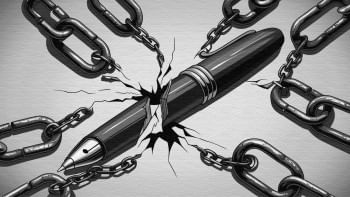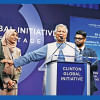The media's role in Bangladesh 2.0

The July-August 2024 uprising marked a historic turning point for Bangladesh. It was more than just a series of protests—it was a collective demand for a future built on accountability and transparency. Across cities and towns, the youth spearheaded this call for change. Their courage and determination resonated with millions, inspiring a vision of "Bangladesh 2.0," a new era that prioritises good governance, public interest, and systemic reform. A key expectation of this transformation was for the media to step up as a pillar of democracy.
Yet, as the movement's fervour begins to fade, troubling patterns suggest that the media's longstanding flaws remain largely unaddressed. While faces in positions of power have changed, the structures and practices that define Bangladesh's media landscape have shown remarkable resistance to change. For decades, the country's media has functioned less as a watchdog for democracy and more as a guard dog, protecting the interests of its owners rather than serving the people.
In Bangladesh, businessmen-politicians have dominated media ownership for years, turning some television channels and newspapers into tools of influence. These media houses, rather than pursuing independent journalism, have been used to shield their owners from tax scrutiny, evade customs regulations, and manoeuvre through bureaucratic hurdles. This entrenched dynamic has eroded the boundary between journalism and propaganda, leading to a loss of public trust in the media.
During the uprising, these media dynamics were laid bare for all to see. As students and citizens demanded justice on the streets, risking their lives, much of the media shied away from supporting them. Instead, some editors aligned themselves with the toppled regime, exposing where their true loyalties lay. Even when the regime fell, these outlets hesitated to question authority or challenge the narratives propagated by those in power. This reluctance underscores how deeply entrenched self-censorship and fear have become in Bangladesh's media ecosystem.
With the fall of the regime came a fleeting hope that the media would embrace its role as a cornerstone of democracy. The expectation was clear: a free press that would amplify the voices of the people, hold power to account and operate without fear or favour. However, the early signs of this so-called "Bangladesh 2.0" have been disheartening.
The chief adviser, for instance, is yet to engage in an open press conference—a crucial forum for accountability and transparency. Instead, he has opted for carefully curated interviews with senior editors who refrained from posing hard questions, opting instead to glorify his leadership. This pattern reflects a continuation of the old norms, where deference to authority outweighs the public's right to know.
Moreover, the harassment of journalists and media workers affiliated with the previous regime is a stark reminder of how vulnerable the press remains. Many reporters and television workers have been arrested and accused of crimes ranging from murder to corruption. While it is undeniable that some individuals supported the fallen regime in unethical ways, the arbitrary nature of these arrests raises serious concerns.
The filing of dubious cases against journalists undermines the rule of law and fosters a culture of fear. Justice cannot be served through vengeance. Even those who were complicit in the regime's wrongdoing deserve due process, not hasty, politically motivated accusations. When the legal system is weaponised to settle scores, it erodes trust in institutions and perpetuates a cycle of lawlessness.
Journalists already operate under immense pressure, facing job insecurity, political harassment, and limited protections. The abrupt criminalisation of media workers not only stifles dissent but also sends a chilling message to others in the profession: stay silent or risk retaliation. For a country striving to rebuild its democracy, this culture of fear is antithetical to progress. If "Bangladesh 2.0" is to succeed, justice must be pursued with fairness, transparency, and accountability—not as a tool for silencing dissent.
Beyond the immediate challenges of political interference and legal harassment, Bangladesh's media faces deeper structural problems. Most media organisations operate on unsustainable business models, heavily reliant on advertising revenue from politically connected corporations. This dependence limits their editorial independence and makes them susceptible to external pressures.
The financial instability journalists often face, in terms of low salaries, limited benefits and precarious working conditions, makes them vulnerable to coercion, undermining their ability to report fearlessly. Without a robust financial foundation, even the most courageous journalists cannot fulfil their roles as defenders of democracy.
Adding to this is the absence of a governing body for journalism. Unlike professions such as law or medicine, journalism in Bangladesh lacks a regulatory framework that sets ethical standards and ensures accountability. In the digital age, this vacuum has been filled by a flood of unverified information, with anyone wielding a smartphone claiming to be a journalist. This lack of professional accreditation and training has further eroded public trust in the media.
Reforming Bangladesh's media sector requires a multi-pronged approach. First and foremost, journalists and editors must reclaim their commitment to truth and public service. This will demand extraordinary courage, particularly in a political environment where questioning authority often invites retaliation.
However, courage alone is not enough. Structural reforms are essential to support fearless journalism. Media organisations must explore sustainable business models, such as subscription-based services or reader-funded journalism, to reduce their reliance on politically motivated advertisers. Policymakers, meanwhile, must enact legal protections for journalists, ensuring that they can report without fear of harassment or job loss.
An independent regulatory body for journalism is also imperative. Such an institution could establish accreditation standards, offer professional development programmes, and enforce ethical guidelines. By holding media practitioners accountable for their conduct, it could help restore public confidence in the press.
Despite the challenges, there are reasons for cautious optimism. The repeal of the Digital Security Act, a law that stifled free speech, is a step in the right direction. However, repealing harmful legislation is only the beginning. The true test lies in fostering a culture that values press freedom.
The media's role in this new era cannot be overstated. It must serve as a pillar of democracy, a guardian of the public interest, and a watchdog that holds power to account. This transformation will not happen overnight. It will require a collective commitment from journalists, media owners, policymakers, and civil society. This uprising envisioned a media landscape that amplifies the voices of the people, challenges authority and resists the pull of partisan agendas. Achieving this vision will demand courage, integrity, and systemic reform.
Change is never easy, and progress is rarely linear. But if the movement taught us anything, it's that the people of Bangladesh are ready to demand better. It is now up to the media to meet this moment, proving itself as a force for truth and accountability in this new chapter of the nation's history. The journey to "Bangladesh 2.0" has only just begun, and the media has a vital role to play in shaping its future.
Mahfuz Mishu is special correspondent for Jamuna Television. He can be reached at [email protected].
Views expressed in this article are the author's own.
Follow The Daily Star Opinion on Facebook for the latest opinions, commentaries and analyses by experts and professionals. To contribute your article or letter to The Daily Star Opinion, see our guidelines for submission.


 For all latest news, follow The Daily Star's Google News channel.
For all latest news, follow The Daily Star's Google News channel. 









Comments